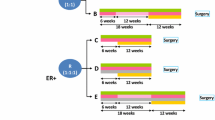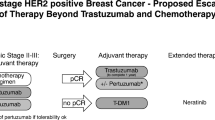Abstract
Purpose
Dual anti-HER2 targeted therapy and chemotherapy is the current first-line standard of care for HER2 + metastatic breast cancer (MBC), with endocrine therapy (ET) the backbone of treatment in hormone receptor positive (HR +) disease. The potential ET benefit in HER2 + /HR + patients is unknown as pivotal dual anti-HER2 clinical trials precluded ET use.
Methods
Real-world data from a multi-site registry of consecutive HER2 + MBC patients treated at clinician discretion were examined. Patients that were HR + (ER + and/or PR +) and had received first-line chemotherapy alongside trastuzumab and pertuzumab were explored. Of 362 patients in the registry, 215 were excluded due to being HR- (n = 210) or not receiving chemotherapy (n = 5).
Results
Of the 147 patients included, 91 (62%) received concurrent ET and 56 (38%) had not. Comparing the groups, there were no significant differences in age, performance status, metastatic sites, use of previous therapy and de novo metastatic disease. More patients with ER + PR + disease versus those with ER + PR- or ER-PR + received ET (73 vs 45%). The addition of ET was associated with significantly improved 5-year PFS (HR 0.58, CI 0.37–0.89, p = 0.014) and OS (HR 0.52, CI 0.31–0.90, p = 0.018), with no increase in adverse events noted.
Conclusion
The addition of ET to first-line dual anti-HER2 therapy post chemotherapy in patients with HER2 + /HR + MBC was associated with major gains in PFS and OS with no safety concerns evident. Further studies of this combination are justified, along with studies of how best to integrate other agents that are active in this patient subset, including CDK4/6 inhibitors.


Similar content being viewed by others
Data availability
The dataset generated during and analysed during the current study are available from the corresponding author on reasonable request.
References
Sung H, Ferlay J, Siegel RL, Laversanne M, Soerjomataram I, Jemal A, Bray F (2021) Global cancer statistics 2020: GLOBOCAN estimates of incidence and mortality worldwide for 36 cancers in 185 Countries. CA Cancer J Clin 71(3):209–249
Society AC: Breast Cancer Facts & Figures 2017–2018. In. Atlanta: American Cancer Society, Inc.; 2017.
Konecny G, Pauletti G, Pegram M, Untch M, Dandekar S, Aguilar Z, Wilson C, Rong HM, Bauerfeind I, Felber M et al (2003) Quantitative association between HER-2/neu and steroid hormone receptors in hormone receptor-positive primary breast cancer. J Natl Cancer Inst 95(2):142–153
Howlader N, Cronin KA, Kurian AW, Andridge R (2018) Differences in breast cancer survival by molecular subtypes in the United States. Cancer Epidemiol Biomarkers Prev 27(6):619–626
Huober J, Fasching PA, Barsoum M, Petruzelka L, Wallwiener D, Thomssen C, Reimer T, Paepke S, Azim HA, Ragosch V et al (2012) Higher efficacy of letrozole in combination with trastuzumab compared to letrozole monotherapy as first-line treatment in patients with HER2-positive, hormone-receptor-positive metastatic breast cancer - results of the eLEcTRA trial. Breast 21(1):27–33
Kaufman B, Mackey JR, Clemens MR, Bapsy PP, Vaid A, Wardley A, Tjulandin S, Jahn M, Lehle M, Feyereislova A et al (2009) Trastuzumab plus anastrozole versus anastrozole alone for the treatment of postmenopausal women with human epidermal growth factor receptor 2-positive, hormone receptor-positive metastatic breast cancer: results from the randomized phase III TAnDEM study. J Clin Oncol 27(33):5529–5537
Johnston S, Pippen J Jr, Pivot X, Lichinitser M, Sadeghi S, Dieras V, Gomez HL, Romieu G, Manikhas A, Kennedy MJ et al (2009) Lapatinib combined with letrozole versus letrozole and placebo as first-line therapy for postmenopausal hormone receptor-positive metastatic breast cancer. J Clin Oncol 27(33):5538–5546
Rimawi M, Ferrero JM, de la Haba-Rodriguez J, Poole C, De Placido S, Osborne CK, Hegg R, Easton V, Wohlfarth C, Arpino G et al (2018) First-line trastuzumab plus an aromatase inhibitor, with or without pertuzumab, in human epidermal growth factor receptor 2-positive and hormone receptor-positive metastatic or locally advanced breast cancer (PERTAIN): a randomized, open-label phase ii trial. J Clin Oncol 36(28):2826–2835
Baselga J, Cortes J, Kim SB, Im SA, Hegg R, Im YH, Roman L, Pedrini JL, Pienkowski T, Knott A et al (2012) Pertuzumab plus trastuzumab plus docetaxel for metastatic breast cancer. N Engl J Med 366(2):109–119
Swain SM, Kim SB, Cortes J, Ro J, Semiglazov V, Campone M, Ciruelos E, Ferrero JM, Schneeweiss A, Knott A et al (2013) Pertuzumab, trastuzumab, and docetaxel for HER2-positive metastatic breast cancer (CLEOPATRA study): overall survival results from a randomised, double-blind, placebo-controlled, phase 3 study. Lancet Oncol 14(6):461–471
Blackwell KL, Burstein HJ, Storniolo AM, Rugo HS, Sledge G, Aktan G, Ellis C, Florance A, Vukelja S, Bischoff J et al (2012) Overall survival benefit with lapatinib in combination with trastuzumab for patients with human epidermal growth factor receptor 2-positive metastatic breast cancer: final results from the EGF104900 Study. J Clin Oncol 30(21):2585–2592
Johnston SRD, Hegg R, Im SA, Park IH, Burdaeva O, Kurteva G, Press MF, Tjulandin S, Iwata H, Simon SD et al (2018) Phase III, randomized study of dual human epidermal growth factor receptor 2 (HER2) blockade with lapatinib plus trastuzumab in combination with an Aromatase inhibitor in postmenopausal women with HER2-positive, hormone receptor-positive metastatic breast cancer: ALTERNATIVE. J Clin Oncol 36(8):741–748
Cardoso F, Senkus E, Costa A, Papadopoulos E, Aapro M, Andre F, Harbeck N, Aguilar Lopez B, Barrios CH, Bergh J et al (2018) 4th ESO-ESMO International consensus guidelines for advanced breast cancer (ABC 4)dagger. Ann Oncol 29(8):1634–1657
Verma S, Miles D, Gianni L, Krop IE, Welslau M, Baselga J, Pegram M, Oh DY, Dieras V, Guardino E et al (2012) Trastuzumab emtansine for HER2-positive advanced breast cancer. N Engl J Med 367(19):1783–1791
Statler AB, Hobbs BP, Wei W, Gupta A, Blake CN, Nahleh ZA (2019) Real-world treatment patterns and outcomes in HR+/HER2+ metastatic breast cancer patients: a national cancer database analysis. Sci Rep 9(1):18126
du Manoir JM, Francia G, Man S, Mossoba M, Medin JA, Viloria-Petit A, Hicklin DJ, Emmenegger U, Kerbel RS (2006) Strategies for delaying or treating in vivo acquired resistance to trastuzumab in human breast cancer xenografts. Clin Cancer Res 12(3 Pt 1):904–916
Valabrega G, Montemurro F, Aglietta M (2007) Trastuzumab: mechanism of action, resistance and future perspectives in HER2-overexpressing breast cancer. Ann Oncol 18(6):977–984
Sabnis G, Schayowitz A, Goloubeva O, Macedo L, Brodie A (2009) Trastuzumab reverses letrozole resistance and amplifies the sensitivity of breast cancer cells to estrogen. Cancer Res 69(4):1416–1428
Schettini F, Buono G, Cardalesi C, Desideri I, De Placido S, Del Mastro L (2016) Hormone receptor/human epidermal growth factor receptor 2-positive breast cancer: where we are now and where we are going. Cancer Treat Rev 46:20–26
Im SA, Lu YS, Bardia A, Harbeck N, Colleoni M, Franke F, Chow L, Sohn J, Lee KS, Campos-Gomez S et al (2019) Overall survival with ribociclib plus endocrine therapy in breast cancer. N Engl J Med 381(4):307–316
Turner NC, Slamon DJ, Ro J, Bondarenko I, Im SA, Masuda N, Colleoni M, DeMichele A, Loi S, Verma S et al (2018) Overall survival with palbociclib and fulvestrant in advanced breast cancer. N Engl J Med 379(20):1926–1936
Funding
The authors declare that no funds, grants, or other support were received during the preparation of this manuscript.
Author information
Authors and Affiliations
Contributions
ML, SWL, PG and LG: contributed to conceptualization, methodology and design. All authors contributed to material preparation and data collection. ML: analysis and the first draft was performed and all authors commented on previous versions of the manuscript. All authors read and approved the final manuscript.
Corresponding author
Ethics declarations
Conflict of interest
SWL has received institutional research grants from Novartis and royalty payments. RDB is on the advisory board for AstraZeneca, Novartis and Gilead, has received speaker honoraria from Gilead and Eli Lilly and research grants from Pfizer, Novartis and AstraZeneca. BY is on the advisory board for Roche/Genetech, and has received speaker honoraria and travel grant from Roche. AA has received institutional research funding from Bayer, AstraZeneca, Amgen, Astellas, Janssen, MSD and Mundipharma, and honoraria from Amgen, Janssen and Eisai. VW has received institutional research funding from Pierre Fabre, Amgen, Roche, MSD, AstraZeneca and Merck, and speaker honoraria from Amgen and Janssen. JM is on the advisory board for GSK and AstraZeneca and has received support for virtual education meeting attendance from GSK, AstraZeneca and Novartis. ML, LM, SG, MN, LN, IC, JT, FB, PG and LG have no conflicts of interest to disclose.
Ethical approval
This study received ethics approval for the collection and utilization of de-identified patient data from individual sites and from the ethics committee overseeing the TABITHA registry.
Additional information
Publisher's Note
Springer Nature remains neutral with regard to jurisdictional claims in published maps and institutional affiliations.
Rights and permissions
Springer Nature or its licensor (e.g. a society or other partner) holds exclusive rights to this article under a publishing agreement with the author(s) or other rightsholder(s); author self-archiving of the accepted manuscript version of this article is solely governed by the terms of such publishing agreement and applicable law.
About this article
Cite this article
Loft, M., Lok, S.W., De Boer, R. et al. Addition of endocrine therapy to dual anti-HER2 targeted therapy in initial treatment of HER2 + /HR + metastatic breast cancer. Breast Cancer Res Treat 198, 67–74 (2023). https://doi.org/10.1007/s10549-022-06856-1
Received:
Accepted:
Published:
Issue Date:
DOI: https://doi.org/10.1007/s10549-022-06856-1




